Apple's features graveyard: Once heavily marketed, now gone
While Apple continues to release new products and features every year at their Apple Events, that has not stopped them from ruthlessly dropping once-popular aspects and features.
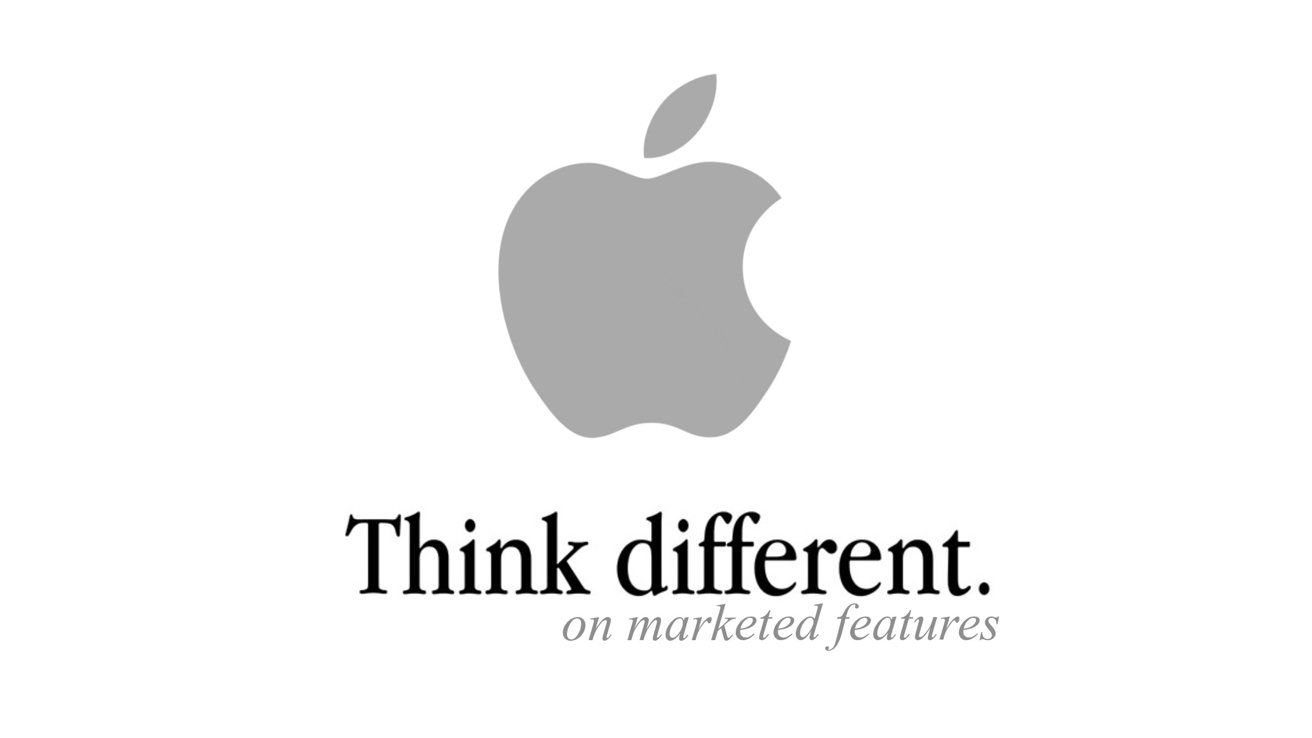
Once heavily marketed, it seems that no feature is safe from Apple's chopping block when an alternative is found to them.
Apple marketed this feature as a shortcut and easier way for people to be able to get to what they wanted to do more simply and intuitively. It also allowed new gestures, such as peak-and-pop, and new features, such as Live Photos, to be introduced.
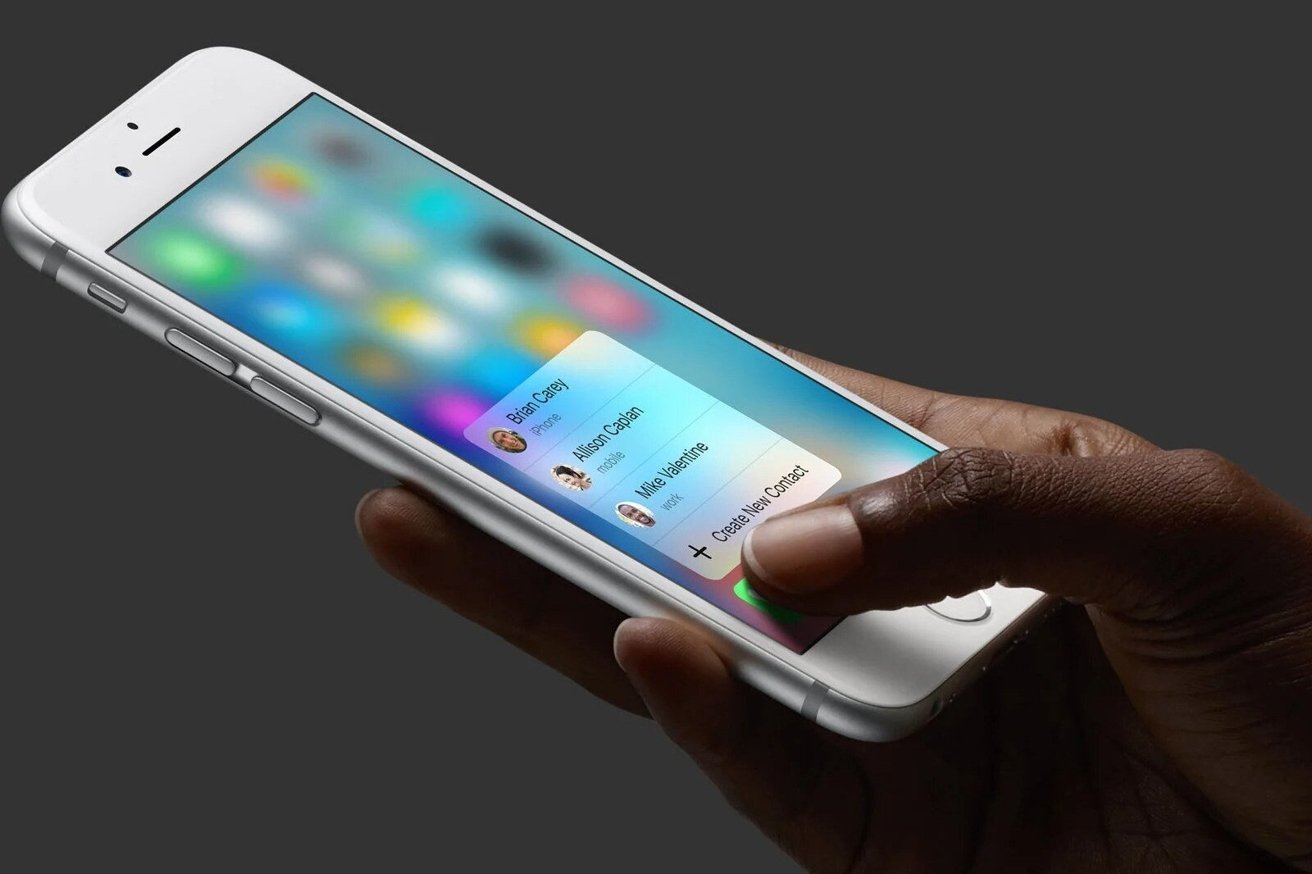
3D Touch was advertised as the feature that changed how to do everyday tasks (like listening to music, reading a text, reading an email, and/or even reading the news).
"For the first time - along with recognizing familiar gestures - iPhone also recognizes force," said Jony Ive, former chief design officer at Apple, during the introduction of the iPhone 6s.
Many thought this would be the new standard technology for not just iPhones, but other devices within other companies as well.
The feature continued to be implemented in iPhones from the iPhone 6s to the iPhone Xs, but with the iPhone Xr, Apple decided to not include a 3D Touch-enabled display. Instead of including it, the company implemented a new technology called "Haptic Touch".
iPhones no longer include 3D Touch technology, and Apple Watches do not include Force Touch technology as well.
One of the favorite capabilities of 3D Touch was the ability to set live wallpapers on the Lock Screen, but in iOS 16, that can no longer be done. Holding down the screen takes you into the new customization center for your Lock Screen.
While Haptic Touch seems to be the best alternative to 3D Touch, it does not give the same experience. 3D Touch was fast in responding to force and acting upon it, but Haptic Touch has a delay between you enabling the feature and it reacting to the gesture. No longer is it press further in for more options, but now it is held and tapped to accomplish the same tasks.
3D Touch was a widely used and versatile feature that was implemented across the whole operating system. The departure of the feature was not mourned upon, but many people would like to see it back.
3D Touch brought elements to the iPhone that no other phone has done before it. Swipe and tap were generic, but pressure and force were something new.
While the gestures are still incorporated in iOS, implementing back 3D Touch technology could expand upon them and make the shortcuts introduced with them relevant again.
The original iPod had many different variations of it during its lifespan. Different versions of the device include the iPod classic, the iPod shuffle, the iPod mini, the iPod photo, the iPod nano, and - most popular - the iPod touch.
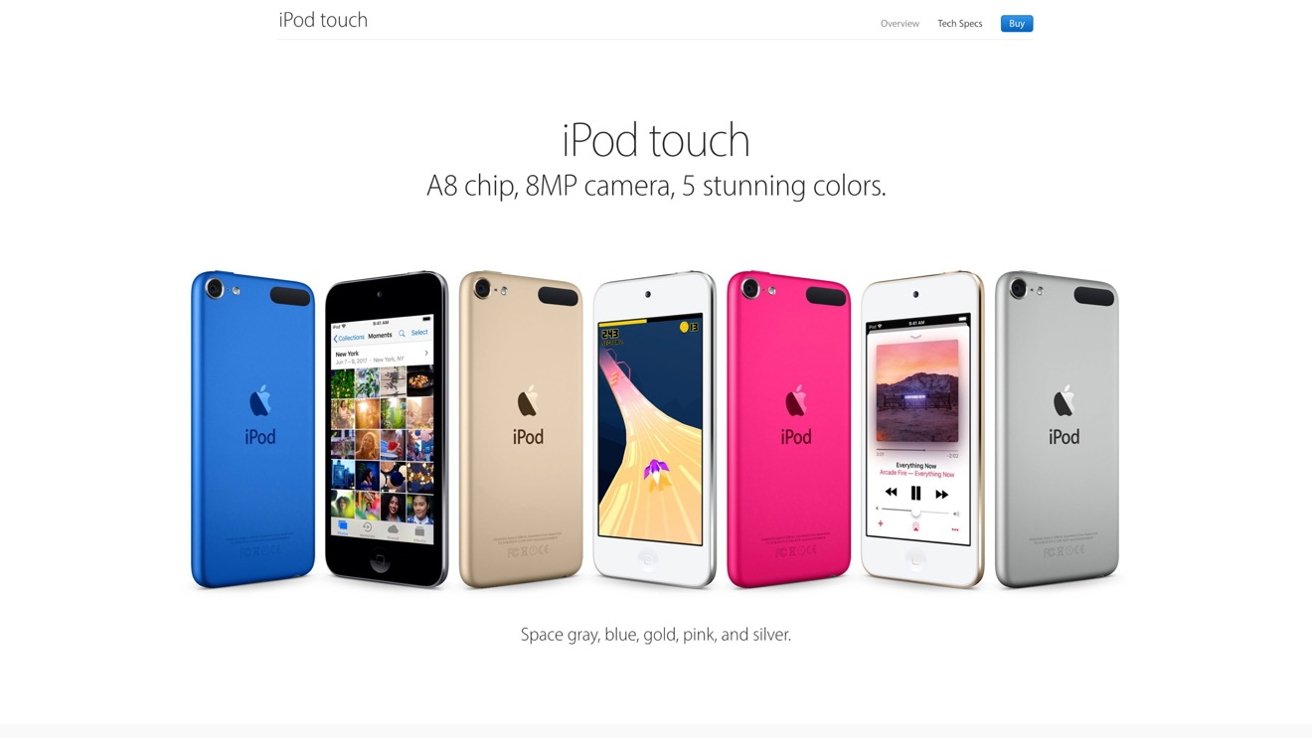
The iPod touch was first released in 2007 after many consumers liked the touch screen interface of the iPhone, but disliked the high price tag that came with it. The original iPod touch started at $299 for eight gigabytes of storage.
When the iPhone 4 was released, it brought video chatting in the form of FaceTime, and in 2010, the iPod touch received that feature as well. The fourth generation iPod touch included a front and rear camera, a retina display, an accelerometer and gyroscope that enhanced gaming experiences, and a thinner design.
In 2012, alongside the iPhone 5, Apple redesigned the iPod touch to have a four-inch screen, multiple new color options, a flatter back design, a new rear camera that protruded from the back, faster processors, a new addition called the "iPod loop" - which allowed owners to attach a wrist strap to their device, and ran iOS 6 - which supported Siri. This was the last major update the iPod would receive, and by this time, the iPod line stopped receiving annual updates.
Alongside the new iPod touches came redesigned iPod Nanos and iPod shuffles. Both iPod models received touch screen capabilities and new color options as well. These were the last generations of those models.
After the fifth-generation iPod touch was released, no big update to the line came. Other than the removal of the iPod loop, the only updates that came to the device were internal with updated Apple-made chips.
After years of no new update of any sort for the iPod touch, Apple announced on May 10, 2022, that they would no longer be producing any more units of the device. This ended the era of the iPod.
Many point to the decline of the iPod touch being caused by the uprise of the iPhone. Many saw the iPod touch as an iPhone without the phone, and looking at the device offered, it essentially was that.
While the iPod is now dead and is no longer manufactured, the device lives on in Apple's history, and will not be forgotten for what it brought to the company, pop culture, and society as a whole.
As a useful tool to many, Aperture allowed people to organize photos by faces, places, and/or keywords. It provided different ways of grouping pictures and different versions of them.
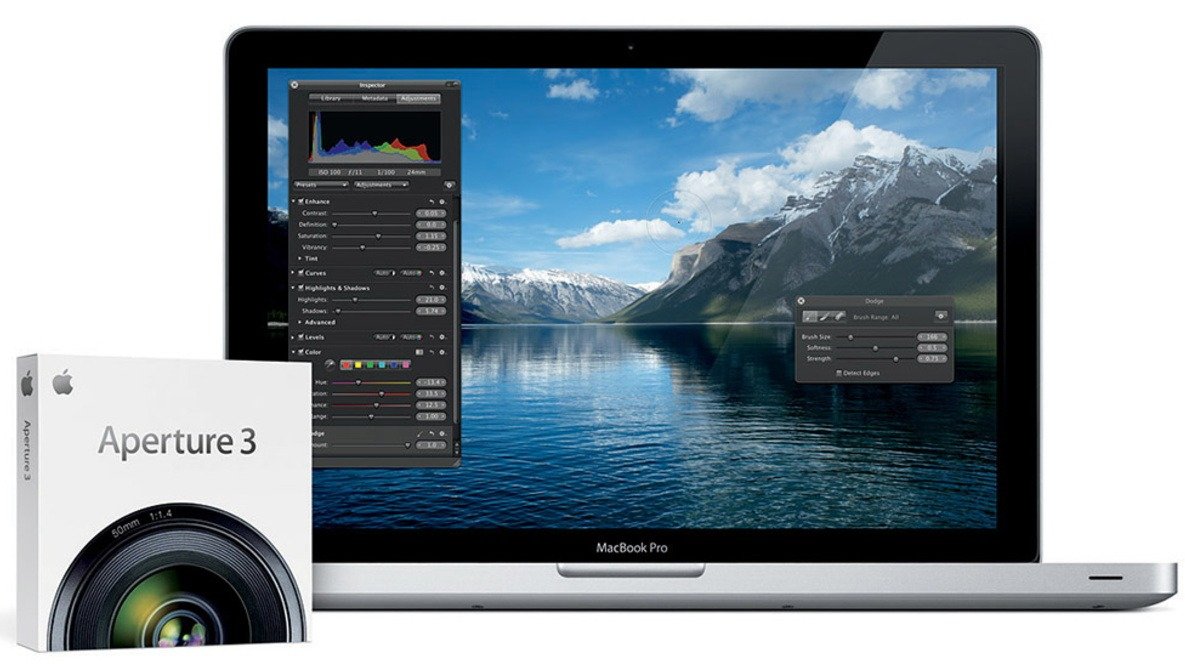
Edits for photos were also very prominent features by allowing images to be fine-tuned with skin smoothing, sharpening, spot removal, color retouching, and lens correction. Images could be imported from a USB drive, memory card, or directly from a connected camera.
Exporting material was widely loved as well due to the application being able to support many file formats. Aperture supported RAW files, provided non-destructive editing, and read and wrote IPTC image metadata.
Apple discontinued the development of Aperture in 2014 after it was announced that it would not be supported after macOS Mojave. This was due to the application being 32-bit and the operating system would only tolerate 64-bit applications.
In 2015, Apple decided to remove Aperture, along with iPhoto, from the Mac App Store due to their integration with the Photos app - which would replace it - within macOS. People who have Aperture downloaded on their device could still use it, but no further updates would come to the application.
This was a staple in Apple's naming and marketing campaign around their devices and company, and it did not seem like it was going to change anytime soon.
Starting with the iMac, Apple saw the "I" standing for the internet, but after more products received the naming treatment, the company explained that the front-standing letter could stand for "individual", "inspire", and/or "inform".
In 2014, many consumers had a gist that Apple would release their own version of the smartwatch alongside the next generation of the iPhone. Due to Apple's naming scheme, many thought the smartwatch would be called "iWatch". All those people were wrong.
Apple introduced their new smartwatch at the iPhone 6 event in 2014, and unveiled that the device would be called "Apple Watch". This was the beginning of Apple moving away from the "I" for their new products and services.
After the Apple Watch was introduced, more of Apple's products and services got the "Apple" name in front instead of an "I". AppleOne - Apple's subscription service bundle - falls into the category, Apple Fitness+ and Apple Music (just to name two services) also fit into the category, and HomePod mini does not even utilize the "Apple" or "I" name.
While Apple continues to move away from the "i" addition to product names, Apple does not need their name in front for people to know it's Apple. Apple is a very well-known company, and when releasing products, people will know where it comes from.
Designers could drag and drop their photos and videos to customize their pages. Templates centered around blogs, podcasts, and a photo and move gallery to be included with a "Welcome" and "About Me" page.
For third-party customization, iWebs allowed its creators to embed YouTube videos, Google Maps, and include a countdown time - to name a few.
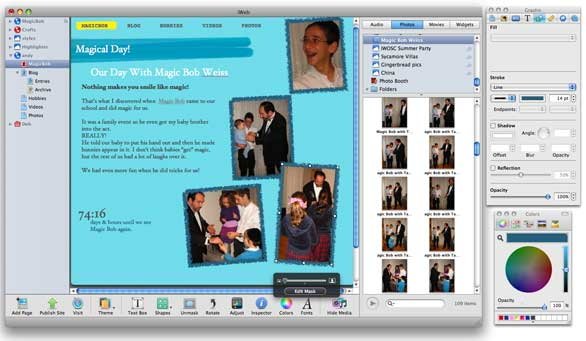
While the site seemed promising with the customization options that were offered, there were some flaws and bugs that were apparent. Some areas that were negatively seen were that comments on blog pages were not supported on non-MobileMe hosted websites, password protection was not supported, creating templates required complex third-party software, and there was no option to directly edit HTML code for the templates.
Apple discontinued MobileMe in June of 2012. iWeb websites were deleted if not hosted somewhere else, and Apple provided instructions on how to move your website to another host.
MobileMe service transitioned to iCloud once introduced in 2011.
Apple introduced a new MacBook Air, MacBook Pro, and Mac mini with their new M1 chips inside. These new chips allowed faster speeds, longer battery life, and - for the MacBook Air - no fan to be included in the body of the device.
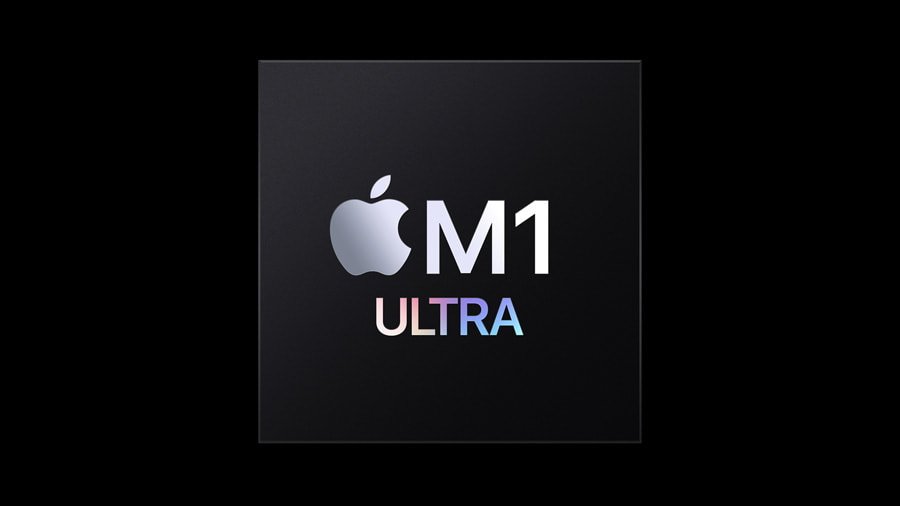
In the Spring of 2021, Apple introduced the new iMacs that included an all-new design, brought back the color exteriors that the desktop once had, a new 1080p camera, and - of course - the addition of the new M1 chip. These new upgrades and additions positioned the iMac to be used in a more versatile way, especially in a more-remote setting due to the COVID-19 pandemic.
While most of Apple's computers have an M-series chip inside of them, the Mac Pro still houses an Intel chip. Though this is the case, John Ternus - the senior vice president of hardware engineering at Apple - has stated that "that is for another day"; indicating that the company is in motion to bring an M-series chip to the Mac model.
Currently, Apple is on the second generation of its chips by introducing the M2 processor in the 2022 MacBook Airand the 2022 13-inch MacBook Pro with Touch Bar. Apple also brought the M1 processor to the iPad Pro and iPad Air, showing that the chip can be used across different devices.
While Intel chips are making their way out of Apple devices, it should be known that Intel has not backed down from the competition and introduced the 12th generation Intel chip that they claim is faster than the M1 Max chip found inside the 16-inch MacBook Pro.
Intel chips played an important role in processing MacBooks, and also deciding what configuration the consumer wanted for their device by choosing the version of the Intel chip they wanted to possess.
While the transition from Intel to M-series chips is nearly complete, Intel is not going down without a fight for their chips, and Apple plans to continue to move along with theirs as they update their MacBook and iPad lines.
When presenting the departure of the headphone jack, Phil Schiller, an Apple Fellow responsible for leading the App Store and Apple Events, revealed that the reason to remove the feature came down to "courage" and being able to move on from an old design to a newer one that would benefit the consumer.
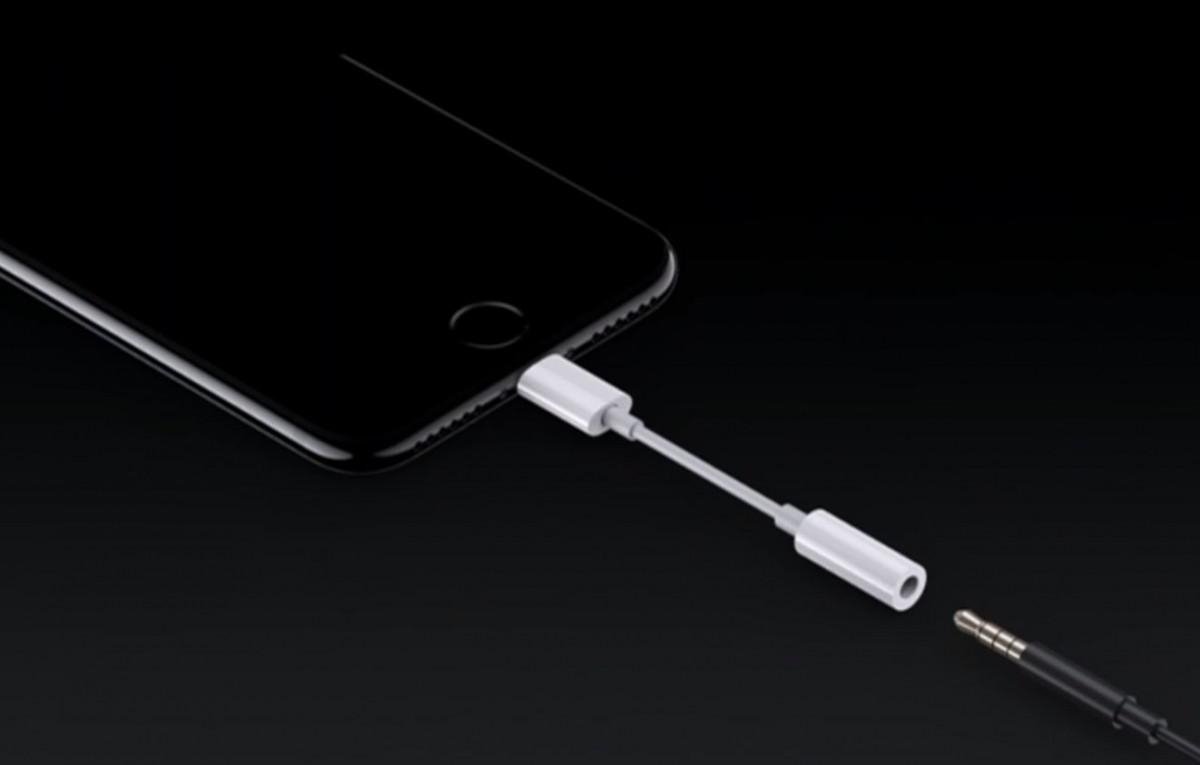
The removal also allowed Apple to make the iPhone 7 line, and future devices, water and dust resistant due to a newly enclosed design located inside the devices.
Since the transition from the headphone jack to lighting for earbuds was major, Apple included light-port wired earbuds and an adapter in every purchase of an iPhone 7 or 7 Plus so that any 3.5-millimeter headphones could still be used with the owner's new device. Apple stopped including this adapter in late 2018 with the release of the iPhone XS and iPhone XR.
The removal of the headphone jack also paved the way for Apple to introduce their new wireless earbuds: AirPods. Once made fun of due to the design of the product, AirPods have become the best-selling earbuds and have produced multiple different models, such as AirPods (regular), AirPods Pro, and AirPods Max.
The transition to port-based wired audio output made its transitions to iPads as well with the iPad Pro. Now listeners have to purchase headphones that connect via USB-C or an adapter that connects 3.5-millimeter headphones to USB-C as well.
The Mac line is the only line of products by Apple that still include a headphone jack.
While the headphone jack does not seem to be returning to any iPhones or iPads, the transition does not seem to hurt as much anymore or be that big of a burden. Most people have since either learned to live with lightning earbuds, purchased AirPods, or have purchased Bluetooth based headphones to listen to audio from.
Apple has gotten rid of these features and components in their devices, but it does not mean the community has forgotten the importance that they once brought. These features led the way for how consumer devices are used now and what they hold.
While Apple continues to innovate and update its devices right into the future, it will be interesting to see which features once prominently used will get the chop next, and how Apple will substitute them with new integrated experiences.
Read on AppleInsider

Once heavily marketed, it seems that no feature is safe from Apple's chopping block when an alternative is found to them.
3D Touch
Introduced originally as "Force Touch" on the first generation of the Apple Watch, it was assumed that the technology would be coming to the iPhone sooner or later after its introduction. The feature was released on the iPhone 6s in 2015 under the name "3D Touch".Apple marketed this feature as a shortcut and easier way for people to be able to get to what they wanted to do more simply and intuitively. It also allowed new gestures, such as peak-and-pop, and new features, such as Live Photos, to be introduced.

3D Touch was advertised as the feature that changed how to do everyday tasks (like listening to music, reading a text, reading an email, and/or even reading the news).
"For the first time - along with recognizing familiar gestures - iPhone also recognizes force," said Jony Ive, former chief design officer at Apple, during the introduction of the iPhone 6s.
Many thought this would be the new standard technology for not just iPhones, but other devices within other companies as well.
The feature continued to be implemented in iPhones from the iPhone 6s to the iPhone Xs, but with the iPhone Xr, Apple decided to not include a 3D Touch-enabled display. Instead of including it, the company implemented a new technology called "Haptic Touch".
iPhones no longer include 3D Touch technology, and Apple Watches do not include Force Touch technology as well.
One of the favorite capabilities of 3D Touch was the ability to set live wallpapers on the Lock Screen, but in iOS 16, that can no longer be done. Holding down the screen takes you into the new customization center for your Lock Screen.
While Haptic Touch seems to be the best alternative to 3D Touch, it does not give the same experience. 3D Touch was fast in responding to force and acting upon it, but Haptic Touch has a delay between you enabling the feature and it reacting to the gesture. No longer is it press further in for more options, but now it is held and tapped to accomplish the same tasks.
3D Touch was a widely used and versatile feature that was implemented across the whole operating system. The departure of the feature was not mourned upon, but many people would like to see it back.
3D Touch brought elements to the iPhone that no other phone has done before it. Swipe and tap were generic, but pressure and force were something new.
While the gestures are still incorporated in iOS, implementing back 3D Touch technology could expand upon them and make the shortcuts introduced with them relevant again.
The iPod
Introduced in 2001, Steve Jobs marketed the iPod as being able to "hold 1,000 songs in your pocket". Future releases would allow people to upload their photos and videos to their iPods as well.The original iPod had many different variations of it during its lifespan. Different versions of the device include the iPod classic, the iPod shuffle, the iPod mini, the iPod photo, the iPod nano, and - most popular - the iPod touch.

The iPod touch was first released in 2007 after many consumers liked the touch screen interface of the iPhone, but disliked the high price tag that came with it. The original iPod touch started at $299 for eight gigabytes of storage.
When the iPhone 4 was released, it brought video chatting in the form of FaceTime, and in 2010, the iPod touch received that feature as well. The fourth generation iPod touch included a front and rear camera, a retina display, an accelerometer and gyroscope that enhanced gaming experiences, and a thinner design.
In 2012, alongside the iPhone 5, Apple redesigned the iPod touch to have a four-inch screen, multiple new color options, a flatter back design, a new rear camera that protruded from the back, faster processors, a new addition called the "iPod loop" - which allowed owners to attach a wrist strap to their device, and ran iOS 6 - which supported Siri. This was the last major update the iPod would receive, and by this time, the iPod line stopped receiving annual updates.
Alongside the new iPod touches came redesigned iPod Nanos and iPod shuffles. Both iPod models received touch screen capabilities and new color options as well. These were the last generations of those models.
After the fifth-generation iPod touch was released, no big update to the line came. Other than the removal of the iPod loop, the only updates that came to the device were internal with updated Apple-made chips.
After years of no new update of any sort for the iPod touch, Apple announced on May 10, 2022, that they would no longer be producing any more units of the device. This ended the era of the iPod.
Many point to the decline of the iPod touch being caused by the uprise of the iPhone. Many saw the iPod touch as an iPhone without the phone, and looking at the device offered, it essentially was that.
While the iPod is now dead and is no longer manufactured, the device lives on in Apple's history, and will not be forgotten for what it brought to the company, pop culture, and society as a whole.
Aperture
Aperture was an image organizing program developed by Apple for people who owned Macs to use. The application was first introduced in 2005.As a useful tool to many, Aperture allowed people to organize photos by faces, places, and/or keywords. It provided different ways of grouping pictures and different versions of them.

Edits for photos were also very prominent features by allowing images to be fine-tuned with skin smoothing, sharpening, spot removal, color retouching, and lens correction. Images could be imported from a USB drive, memory card, or directly from a connected camera.
Exporting material was widely loved as well due to the application being able to support many file formats. Aperture supported RAW files, provided non-destructive editing, and read and wrote IPTC image metadata.
Apple discontinued the development of Aperture in 2014 after it was announced that it would not be supported after macOS Mojave. This was due to the application being 32-bit and the operating system would only tolerate 64-bit applications.
In 2015, Apple decided to remove Aperture, along with iPhoto, from the Mac App Store due to their integration with the Photos app - which would replace it - within macOS. People who have Aperture downloaded on their device could still use it, but no further updates would come to the application.
The infamous "I"
During the early years of Apple announcing new products, it was always seen that an "I" would come before each name of the device. iPhone, iPad, iPod, and iMac are all devices that fall into the category that utilize the "I" culture.This was a staple in Apple's naming and marketing campaign around their devices and company, and it did not seem like it was going to change anytime soon.
Starting with the iMac, Apple saw the "I" standing for the internet, but after more products received the naming treatment, the company explained that the front-standing letter could stand for "individual", "inspire", and/or "inform".
In 2014, many consumers had a gist that Apple would release their own version of the smartwatch alongside the next generation of the iPhone. Due to Apple's naming scheme, many thought the smartwatch would be called "iWatch". All those people were wrong.
Apple introduced their new smartwatch at the iPhone 6 event in 2014, and unveiled that the device would be called "Apple Watch". This was the beginning of Apple moving away from the "I" for their new products and services.
After the Apple Watch was introduced, more of Apple's products and services got the "Apple" name in front instead of an "I". AppleOne - Apple's subscription service bundle - falls into the category, Apple Fitness+ and Apple Music (just to name two services) also fit into the category, and HomePod mini does not even utilize the "Apple" or "I" name.
While Apple continues to move away from the "i" addition to product names, Apple does not need their name in front for people to know it's Apple. Apple is a very well-known company, and when releasing products, people will know where it comes from.
iWeb
iWeb allowed developers and the community to design and create websites and blogs without having to code anything. These tools included several Apple-designed themes that were unique and easy to use.Designers could drag and drop their photos and videos to customize their pages. Templates centered around blogs, podcasts, and a photo and move gallery to be included with a "Welcome" and "About Me" page.
For third-party customization, iWebs allowed its creators to embed YouTube videos, Google Maps, and include a countdown time - to name a few.

While the site seemed promising with the customization options that were offered, there were some flaws and bugs that were apparent. Some areas that were negatively seen were that comments on blog pages were not supported on non-MobileMe hosted websites, password protection was not supported, creating templates required complex third-party software, and there was no option to directly edit HTML code for the templates.
Apple discontinued MobileMe in June of 2012. iWeb websites were deleted if not hosted somewhere else, and Apple provided instructions on how to move your website to another host.
MobileMe service transitioned to iCloud once introduced in 2011.
Intel chips
During WWDC 2020, Apple announced a two-year transition from Intel chips to their silicon chips located inside their Mac line. The fruit of their labor would be seen during a special event in November of 2020.Apple introduced a new MacBook Air, MacBook Pro, and Mac mini with their new M1 chips inside. These new chips allowed faster speeds, longer battery life, and - for the MacBook Air - no fan to be included in the body of the device.

In the Spring of 2021, Apple introduced the new iMacs that included an all-new design, brought back the color exteriors that the desktop once had, a new 1080p camera, and - of course - the addition of the new M1 chip. These new upgrades and additions positioned the iMac to be used in a more versatile way, especially in a more-remote setting due to the COVID-19 pandemic.
While most of Apple's computers have an M-series chip inside of them, the Mac Pro still houses an Intel chip. Though this is the case, John Ternus - the senior vice president of hardware engineering at Apple - has stated that "that is for another day"; indicating that the company is in motion to bring an M-series chip to the Mac model.
Currently, Apple is on the second generation of its chips by introducing the M2 processor in the 2022 MacBook Airand the 2022 13-inch MacBook Pro with Touch Bar. Apple also brought the M1 processor to the iPad Pro and iPad Air, showing that the chip can be used across different devices.
While Intel chips are making their way out of Apple devices, it should be known that Intel has not backed down from the competition and introduced the 12th generation Intel chip that they claim is faster than the M1 Max chip found inside the 16-inch MacBook Pro.
Intel chips played an important role in processing MacBooks, and also deciding what configuration the consumer wanted for their device by choosing the version of the Intel chip they wanted to possess.
While the transition from Intel to M-series chips is nearly complete, Intel is not going down without a fight for their chips, and Apple plans to continue to move along with theirs as they update their MacBook and iPad lines.
The headphone jack
Leading up to the launch of the iPhone 7 and iPhone 7 Plus back in 2016, multiple reports came out that the devices would ditch the 3.5-millimeter headphone jack in replacement for lighting-based connected earphones. This created a lot of controversy around the decision, and was discussed amongst many people and other smartphone companies - especially Samsung.When presenting the departure of the headphone jack, Phil Schiller, an Apple Fellow responsible for leading the App Store and Apple Events, revealed that the reason to remove the feature came down to "courage" and being able to move on from an old design to a newer one that would benefit the consumer.

The removal also allowed Apple to make the iPhone 7 line, and future devices, water and dust resistant due to a newly enclosed design located inside the devices.
Since the transition from the headphone jack to lighting for earbuds was major, Apple included light-port wired earbuds and an adapter in every purchase of an iPhone 7 or 7 Plus so that any 3.5-millimeter headphones could still be used with the owner's new device. Apple stopped including this adapter in late 2018 with the release of the iPhone XS and iPhone XR.
The removal of the headphone jack also paved the way for Apple to introduce their new wireless earbuds: AirPods. Once made fun of due to the design of the product, AirPods have become the best-selling earbuds and have produced multiple different models, such as AirPods (regular), AirPods Pro, and AirPods Max.
The transition to port-based wired audio output made its transitions to iPads as well with the iPad Pro. Now listeners have to purchase headphones that connect via USB-C or an adapter that connects 3.5-millimeter headphones to USB-C as well.
The Mac line is the only line of products by Apple that still include a headphone jack.
While the headphone jack does not seem to be returning to any iPhones or iPads, the transition does not seem to hurt as much anymore or be that big of a burden. Most people have since either learned to live with lightning earbuds, purchased AirPods, or have purchased Bluetooth based headphones to listen to audio from.
No feature is safe
We've skipped some obvious things, like the death of the Apple II, 32-bit software extermination, the removal of the floppy drive and more. And, there are more likely on the block awaiting the axe -- we suspect eGPU technology has seen its last days.Apple has gotten rid of these features and components in their devices, but it does not mean the community has forgotten the importance that they once brought. These features led the way for how consumer devices are used now and what they hold.
While Apple continues to innovate and update its devices right into the future, it will be interesting to see which features once prominently used will get the chop next, and how Apple will substitute them with new integrated experiences.
Read on AppleInsider

Comments
Spaces, as I've configured it, transforms my four real displays into 20 virtual displays. My five virtual desktops are organized like this:
1. Messaging, conferencing, and social media: Messages, Microsoft Teams, Slack, Twitterific
2. Web: Safari and Microsoft Edge
3. Remote connections: Terminal, Screen Sharing, and Microsoft Remote Desktop
4. Calendar & email: Fantastical & Mail
5. Creative: Final Cut Pro, Logic Pro, Compressor, Adobe Photoshop, Adobe Illustrator, Pixelmator Pro, etc.
Spaces is an incredibly useful feature for me, and I've got 15 years of muscle memory for accessing these various applications this way. I agree that "no feature is safe" but am very much hoping Apple doesn't take Spaces away in favor of Stage Manager. Is there anyone using the Ventura beta that could confirm that Spaces remains in place?
In short your buzzword has nothing to do with Apple, the up hill climb for Apple is still the same.
Aperture was a big lost, not making it to Apple Silicon is a tech tragedy, F Apple on that one…
It just makes sense on the watch. In my book it was cut for cost savings, not any improved experience (in the watch).
If anyone could produce an updated version of ClarisWorks, I would buy it instantly.
On the IT side that’s particularly true.
I we t to the very first OpenDoc Parts Hut at Apple and the tech was groundbreaking in terms of the paradigm. You no longer even had a "doc". You had your data, which could be opened anywhere that Parts were supported.
The feature that I am most mess are Apple not letting Siri scan my 10,000 photos for requested pictures of objects, dates, and people. It was such a great feature I hope they bring that back. Also I miss not being able to tell Siri to add something to a note. I have no idea why they took that feature away. Yes, I know that these things can be done manually, but Siri is easier and faster. Seconds seem to count in Apple world as a reason to introduce a feature as time-saving
With that said, I'm struggling to see the point of this particular article because it states the obvious — THINGS CHANGE. It doesn't say much more than that.
Guess what? The Mac once touted the 68000 processor and now it doesn't!
Could I write an article about how the 68000 processor is no longer used in modern Macs? I suppose, but it wouldn't be that interesting because pretty much every geek here knows that already. What I really come here for is "INSIDER" info on Apple. Those are the articles that tickle my delight. Please focus on those!